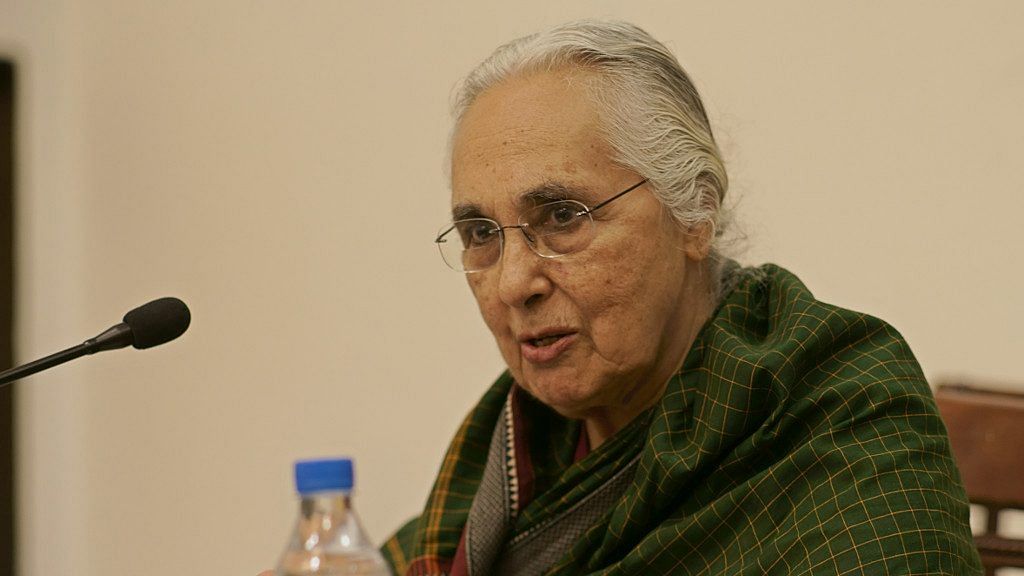New Delhi: The Jawaharlal Nehru University has, in letters, asked its professors emeriti, presumably above 75 years of age, including prominent historian Romila Thapar, to submit a list of what they have been doing in the past couple of years so that their work can be “evaluated”.
Of JNU’s 25 professors emeriti, some like Thapar theoretical physicist R. Rajaraman and sociologist T.K. Oomen are above 75 years of age. ThePrint could not confirm independently if they had also received letters like Thapar has.
Those below 75 years, like the left-leaning political scientist Zoya Hassan and economist Prabhat Patnaik, have not received these letters.
Thapar, a vocal critic of the Modi government, is a well-known historian with several acclaimed books to her credit. She retired from the university in 1991 and was made professor emeritus soon after. The position is an honorary one with no financial implications for an institution. Such professors can pursue academic work and can supervise research students.
Also read: JNU became ‘badnaam like Munni’ says ABVP leader, BJP MP says rename it after Modi
JNU Registrar Pramod Kumar confirmed to ThePrint that a letter has been sent to Thapar, adding that it has been sent to all the professors emeriti and not just her. He, however, did not add anything about the age bracket.
“We did send a letter to all the emeriti last month asking them to give us information on what they have been doing for the last few years so that we can update our records,” Kumar told ThePrint.
Two professors emeriti ThePrint spoke to confirmed that they had also received the letter from the university last month. They did not disclose the contents of the letter but confirmed that the university had asked them for a list of their work for evaluation.
“Yes, I did receive a letter last month from the university asking me to submit information on my work so that it can be evaluated,” said one of professor, speaking to ThePrint on the condition of anonymity.
“But I would not like to share the exact words of the letter as it is something personal and confidential between me and the university,” the professor added.
Professor Thapar also confirmed to ThePrint over the phone that she has received the letter but refused to divulge any further information.
Professor Zoya Hassan said the letter is likely to have gone to people who are 75 years old or above. Describing the decision as “arbitrary”, she pointed out that there was no such rule that professors above 75 years could not be named Emerita.
“The position of professor emeritus is an honorary position given to us; we don’t apply for it,” Hassan told ThePrint. “So, there is no need for an age limit or evaluation of work.”
The 75-year-old rule has so far been applied to politicians by Prime Minister Narendra Modi — leading all politicians above 75 years to be either forcibly retired or not getting any jobs in the first place — but this is the first time that it is being likely applied in the education sphere as well.
Some other professors emeriti with JNU, as per its website, are former University Grants Commission (UGC) chairman Sukhdeo Thorat and genetic scientist Asis Dutta.
Letter evokes sharp reaction
JNU asking for a roundup of work from the emeritus has evoked sharp reactions from the fraternity and Prof. Thapar herself, who in a letter to the university questioned the idea behind such an evaluation.
Professor Thapar’s colleague, Prabhat Patnaik, hit out at the move. “This current action of the JNU contradicts the very basis on which the status of professor emeritus was conferred on retired faculty in the JNU,” Patnaik wrote in a letter published in the Economic and Political Weekly.
“The honour is not conferred for work in the future, work that is yet to be done, but for the work that the faculty member has done before retirement,” the letter adds. “This means that it is based on work that the professor has done before the award was conferred. It is a lifetime achievement award as well; therefore, any assessment of work subsequent to the award is not required. The continuity of the award is not dependent on future work.”
He also added that the Centre for Historical Studies at JNU has also objected to this attempt to reconsider the status of emeritus for Thapar.
